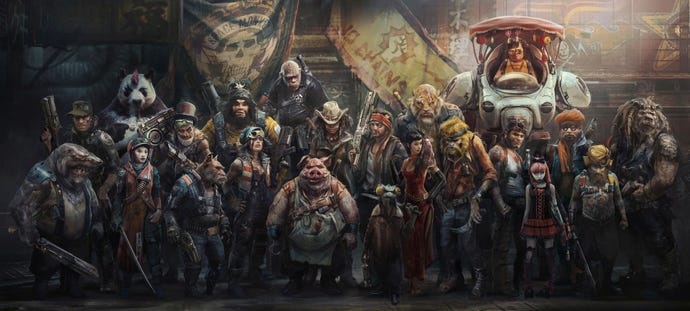If Ubisoft games aren't political, how is it going to make Beyond Good & Evil 2?
“We try to find inspiration from the world around us, but we… we’re building a game. We’re not trying to make a statement.”
This familiar refrain could’ve appeared in any one of Ubisoft's interviews over the past couple of years. But this time, in VG247’s encounter with the developers of Ghost Recon Breakpoint, it was in reply to a question about whether the team ever struggle to match their ideas with the Tom Clancy license - an almost entirely unrelated subject. It’s an answer that suggests Ubisoft’s apolitical stance has become a fundamental part of its media training, to be deployed preemptively, like a military strike in a Clancy novel.
It’s an unsustainable position. Never mind the fact that Clancy’s work was deeply political - he appeared on US television in the hours after 9/11, arguing for more funds to be poured into the CIA’s human intelligence, and later themed an entire series of novels around an off-books agency designed to counter that perceived neglect. But more than that, Ubisoft itself is currently working on the sequel to perhaps the publisher’s most political game, its own post-9/11 statement filled with firebrand commentary: Beyond Good & Evil.
Those politics might come as a surprise to those who haven’t played Michel Ancel’s opus, and perhaps to a few who have. On the outside, it’s a charming action-adventure co-starring anthropomorphic animals on a planet where Mediterranean idyll meets French hip hop and a Ghibli-esque natural world.
But this was 2003. Like Clancy, Ancel and his team were living in a world still impacted by the shockwaves of the terrorist attacks on New York. It wasn’t the event itself that Ubisoft Montpellier was reacting to, but what came afterwards - a climate of fear in which Western powers were able to shore up tools of incarceration and surveillance. In October 2001, George Bush signed the Patriot Act into law, which authorised the indefinite detention of immigrants, the search of homes without the occupant’s knowledge, and FBI access to phone and email records without court order.
In Hillys, the faux-European city of Beyond Good & Evil’s setting, the people live in fear of bombardments from an enemy they never see. Thank goodness, then, for the local army that has moved in to defend them, watching over the city and policing its every aspect. The military is the only thing standing between Hillys and invasion.
Except, of course, Hillys has already been invaded - by the very army that claims to stand up for it. You can see its informational barrage of terror all over Hillys, where the face of the the Alpha Sections general is beamed constantly onto screens in the streets. Under the guise of protection, the army has managed to oppress a population - one that’s not only docile, but thankful.
This isn’t a message that’s buried deep in Beyond Good & Evil - the hip hop track that plays in the bar is called Propaganda, for goodness’ sake. But it is one Ancel didn’t talk about openly until 2009.
“There were a lot of inspirations: the Miyazaki universe, politics and the media, the theme of September 11,” he told French site Progamers in an interview. “The CNN show with army messages and the fear climate. It’s different from Zelda and other titles like that - very good games but they are out of time. BG&E was issued of the actuality.”
It might be an artifact of translation, but that phrase, ‘issued of the actuality’, sticks with me when thinking about Beyond Good & Evil. Ubisoft’s recent protests that fiction is just that, fiction, don’t hold true here. It’s hard to imagine a flight of fancy further than Hillys, with its airships, water dragons, and Jamaican-accented rhinos at the garage. Yet its fiction is rooted in our world and its goings-on.
It’s no mere gimmick that protagonist Jade’s primary weapon isn’t a gun, but a camera. Ubisoft Montpellier knows that photojournalism is perhaps the most radically political act an individual can engage in. It was photojournalists who reshaped the perception of the Vietnam War during and afterwards, leaving US military media managers scrambling to catch up. And sure enough, in Beyond Good & Evil it’s a few key photographs that change the course of the story - indelible truths that open cracks in the dominance of the Alpha Sections.
How, then, will the publicly apolitical Ubisoft handle the sequel to this charged statement of a video game? One worry is that Beyond Good & Evil 2 might dampen its fire. It’s swapped the camera for a pirate spyglass, which might be more thematically appropriate for the game’s crew, but is an instrument of magnification, not documentation. What's more, the move from a linear narrative to open world structure threatens to dilute Beyond Good & Evil's sense of purpose.
Then again, the city at the centre of Ubisoft Montpellier's demos to date has been stuffed with iconography from our world - this time religious - as well as hints at the second citizenship Beyond Good & Evil's animal hybrids endure, something the first game never hinted at. There's injustice here too.
It seems likely there's a contemporary unease bubbling beneath the surface of Beyond Good & Evil 2, one which will reveal itself upon playing. The question is whether Ubisoft, as a mouthpiece, can get away with denying the messages baked into its work one more time - or whether this will be its breakpoint.





